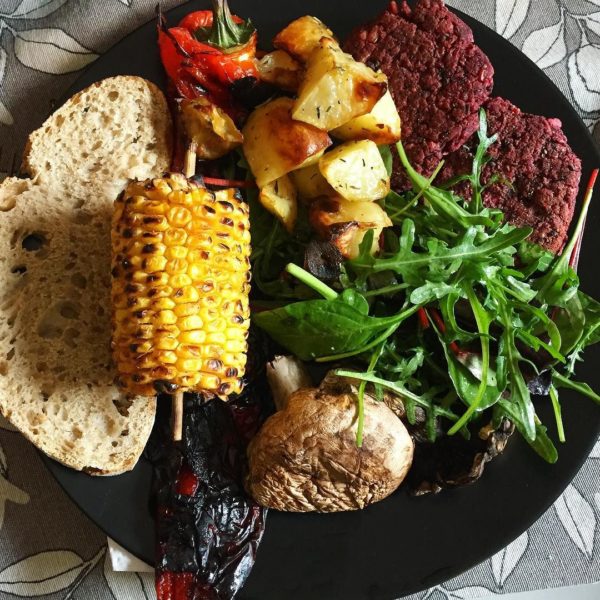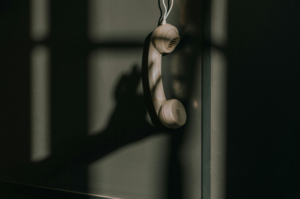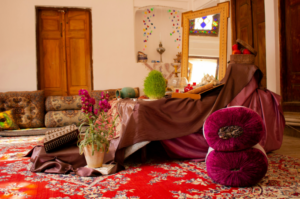
My father no longer chefs,
but he’d stroll, on weekends, to the next street
to sell grilled things
outside a cafe,
(because veteran culinarians have the toughest skins.
Which means they never stop,
never really die,
only they let themselves wane very slowly into smoke),
or he’d sit out at sundown (on weekdays) to journey,
with a shift of clouds, overhead
making jokes, moulding food imageries, like how
someone at the boardinghouse (where he once worked)
punctuated her words with snatches of French
and Chinese and Yoruba—a salad of racial tongues.
When he still routinely left before dawn,
his working days, sometimes, exuded warmth.
And at other times, were
Ice(-cold) crystals, dead in a mocktail.
We followed him, a couple of times,
and at lunch-time, on Day One, we strayed
into a rushing haul of white hats
and aprons, and gloves, and blistering heat, and
fierce aroma of beef-stew, and
instructions and oddities: food-out… a la carte.
And we were lost in the hubbub—
a whirlwind of kitchen gibberish.
Day Two (a near-decade after Day One):
the kitcheners were less incomprehensible,
were motile works of art.
The clanging of ladle against aluminum pot
was woodland music.
A man made onion rings, unable to stop the fleeing tears.
Another melted into a pantry, to soon re-emerge,
leaving a trail of tomato residue
on his wake.
A lady step-fried cuts of croaker-fish, yet
another spiced something akin to jollof rice,
configuring the recipe into a wonderment
that was science and art.
A quartet hummed in key, so that they
passed for Bach or Beethoven
or something in-between.
All stood affixed, raised their eyes when an order came.
Here, all were motion pictures and mannequins, in turn,
and each could have earned a spot in a Picasso.
Day Three:
my father no longer cooks at the hotel.
II
I am a lover of distant nocturnal journeys,
but he’s not.
It’s sundown, four days into New Year.
I start to prep for university, three or four
army checkpoints away.
He forbids this.
Clutching tool-bags,
we stroll instead, to the next street.
He still straps an apron round his waist,
still has his Chef’s Hat, weather-beaten.
A few boys gallivant, fewer watch WrestleMania,
peeking, moment after moment, through the café’s window.
Real buyers seldom appear this early.
He hums as he pries the pepper-bag open,
deftly scoops up fistfuls of chili powder
for the night’s barbecuing
(It’s tilapia, singeing on a crisscross of metals,
not really barbecue).
I start to light the fire, thrice mis-lights
but the old man has a tornado in his mouth.
‘Seems you’ve not fathomed
that business crawls,
that everything reeks of recession
and matchboxes don’t come cheap anymore,
that the littlest inadvertence could take your
life here,
or your sight, or your job, or your customers,’
he thunders.
Then turns back to work, as if
the end of his food-universe would always remain out of reach.
Chsiom Okafor’s “How to Build a Barbacue on Saturday Night” first appeared in Work Naija: The Book of Vocations, an anthology of writing and visual art that explores the idea of work. Edited by Otosirieze Obi-Young and introduced by Rotimi Babatunde, it is the second anthology in the Art Naija Series.
DOWNLOAD: Work Naija: The Book of Vocations
About the Author:
 Chisom Okafor studied Nutrition and Dietetics at the University of Nigeria, Nsukka. He claims he was inspired by his father and an uncle (who were culinarians at some points in their lives).
Chisom Okafor studied Nutrition and Dietetics at the University of Nigeria, Nsukka. He claims he was inspired by his father and an uncle (who were culinarians at some points in their lives).









COMMENTS -
Reader Interactions